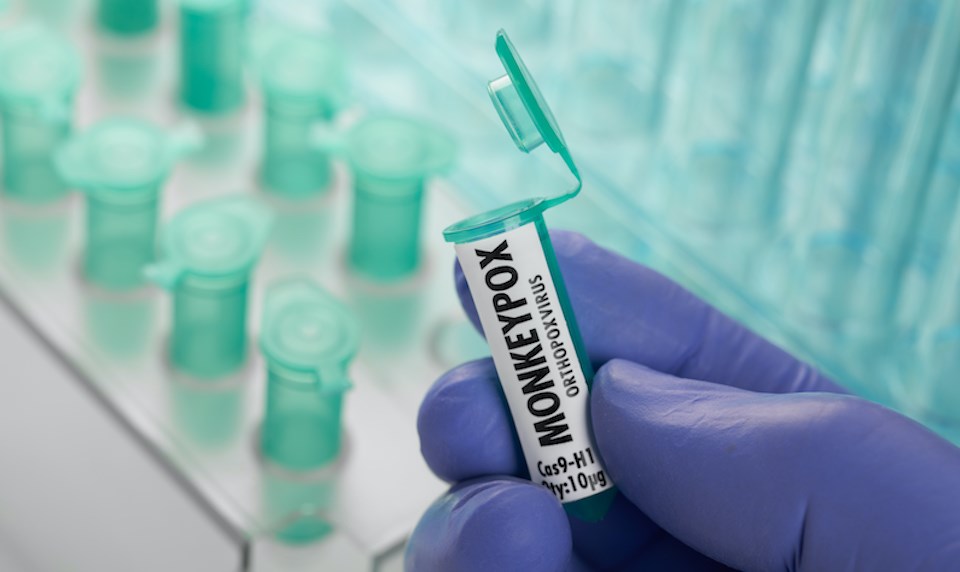As the monkeypox virus continues to spread across the globe, health officials have confirmed cases of the rare virus in four Canadian provinces.
Monkeypox is a rare disease caused by a viral relative of smallpox. It is typically limited to Africa, and rare cases in the U.S. and elsewhere are usually linked to travel there.
The name of the illness originates from its 1958 discovery by scientists who observed two outbreaks of a "pox-like'' disease in research monkeys.
The disease is zoonotic, meaning it's caused by germs that spread between animals and people. The first known human infection was documented in 1970 in a nine-year-old boy in a remote part of Congo.
What's the current situation?
Since May, over 700 cases of monkeypox have been confirmed in non-endemic countries, with the lion's share in Europe. In Canada and the U.S., infections caused by a West African clade, which tends to cause mild disease, have also been diagnosed.
"While most, but not all, recent global infections are among young men who identify as men who have sex with other men, the virus can affect anyone through close person-to-person contact," noes the BCCDC.
How does monkeypox spread?
Monkeypox is spread from person to person through contact with sores and items like bedding or towels that have the virus on them. It can also spread through respiratory droplets from coughs and sneezes during prolonged close, face-to-face contact with a person who has monkeypox. While the virus is not known to transmit through semen, vaginal or rectal fluids, it does spread through close contact during sexual activity.
In Africa, people have been infected through bites from rodents or small animals, and it does not usually spread easily among people.
What are the monkeypox symptoms?
It typically begins with a flu-like illness and swelling of the lymph nodes, followed by a rash on the face and body. According to the BCCDC, symptoms appear in two stages and may last for two to four weeks.
In the first stage, the following symptoms may appear:
- Fever
- Chills
- Intense headache
- Swollen lymph nodes
- Back pain
- Muscle pain
- Fatigue or exhaustion
- Other less common symptoms can include sore throat, cough, nausea or vomiting, and diarrhea
Approximately one to five days after the first stage, the second stage begins. Symptoms may include:
- A rash that often starts on the face or legs and arms, and can affect other parts of the body, such as the hands, feet, mouth and genitals.
- Monkeypox sores usually last between 2 to 3 weeks. The sores change in appearance over time from raised spots to small blisters filled with fluid. They eventually form a scab and fall off.
"The rash tends to be more concentrated on the face and extremities rather than on the trunk. It affects the face (in 95% of cases), and palms of the hands and soles of the feet (in 75% of cases). Also affected are oral mucous membranes (in 70% of cases), genitalia (30%), and conjunctivae (20%), as well as the cornea," notes the World Health Organization (WHO).
What do I do if I've been exposed?
If you have been exposed to the virus, monitor for symptoms. Symptoms can present from five to 21 days after exposure. If you develop symptoms, visit a health care professional. Wear a mask and cover the lesions, and inform the clinic ahead of time of the reason for your visit.
During this period you must limit close contact with others, including sexual contact.
What happens if I become ill with monkeypox?
If you believe you have contracted the monkeypox virus, contact your doctor. Inform them if you've been in close contact with someone who has the virus.
Until you see your healthcare provider, stay at home and self-isolate. If possible, stay away from people you live with and don't share towels, clothing, or linens. See if other members of your household, family, or friends can look after any pets so you do not spread monkeypox to animals.
Public Health will contact you if you test positive for the virus and provide you with instructions for the next steps.
Monkeypox is usually a mild illness and most people recover on their own after a few weeks, notes the BCCDC. While there are no well-established treatments for the virus, "antiviral medication may be considered on a case-by-case basis."
Monkeypox prevention and vaccination
Canada has a limited amount of Imvamune™ — a vaccine that provides protection against the monkeypox virus. It is not currently available for the general public, however.
"It can be used to manage [the] spread of monkeypox and prevent serious illness in people who have been exposed," explains the BCCDC, noting that it does not benefit someone who is already infected.
The risk of monkeypox to the general public is very low, advises the BCCDC. There is no need for the general public to get vaccinated.
With files from the Canadian Press.




